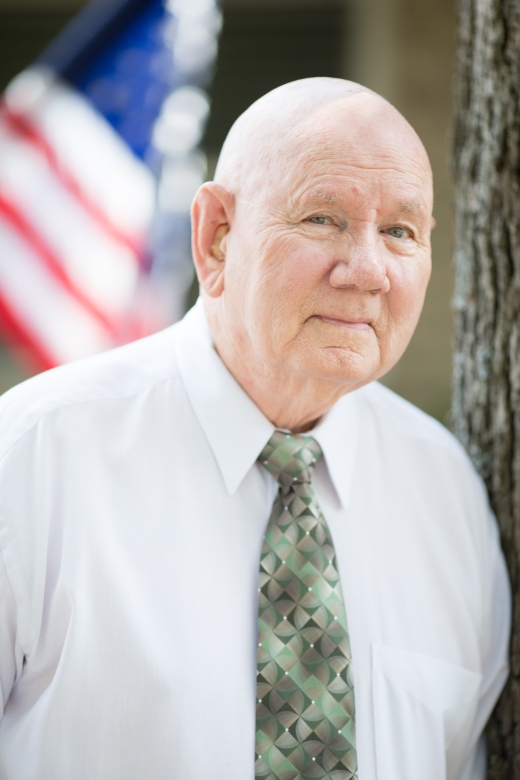Korean War veteran fulfills lifelong dream, visits Chickasaw Nation at age 84
CONTRIBUTED BY Breanne Hill, Media Relations.
This article appeared in the May 2017 edition of the Chickasaw Times
Korean War veteran Charles Holmes did not experience a typical Chickasaw upbringing. His mother, Fleta, was a Chickasaw from Purcell, Okla., but the promise of work in the West lured her to Arizona, where in 1925 she met and married a non-Indian man, Charles Holmes, Sr.
“When my mother and dad got married, my father’s family had a hard time accepting her because of her Indian blood,” Mr. Holmes said. “It seems like there was always conflict with my dad’s side of the family after that.”
The senior Mr. Holmes was a World War I veteran who served four enlistments in the Great War. After Army service, he accepted a job with the border patrol and moved his young family, including his newborn son, Charles Holmes, Jr., to El Paso, Texas.
Even though they were closer to Oklahoma, Mr. Holmes was never taken home to visit, although his mother clearly expressed her love for her people.
“She was proud to be Chickasaw,” Mr. Holmes said. “She always talked about it, and her family, with pride.”
Mr. Holmes world changed when he was nine years old and his father died suddenly. The death left young Charles, his mother and his younger brother to fend for themselves.
That same year, the Japanese bombed Pearl Harbor and the U.S. entered World War II. Mr. Holmes remembers hearing the news that his uncle was drafted into the Army and feeling the need to do something himself.
“I thought, whenever I got grown, I was going to join the service,” he said. “The whole country just seemed to come together during that time. They even had parades when I was in grade school. It was a real patriotic time.”
Mr. Holmes never forgot the pride he felt during the war. When he graduated from high school in May 1951, he finally had the chance to serve his country.
“I had been to California,” he said. “We went up to San Francisco and the ships were leaving out, going to fight in Korea. I made up my mind then to join the Navy.”
Enlisting in the U.S. Navy on July 10, 1951, Mr. Holmes was sent to boot camp. By March 1952, he was stationed on a destroyer off the Korean coast.
“It was our job to protect the carriers, cruisers and battleships from anti-aircraft and anti-submarines along the coastline of Korea,” Mr. Holmes said. “The carriers were sending in the planes and bombs to Korea, so they had to be protected.
“If anything got hit by enemy fire, it was supposed to be us.”
Mr. Holmes served three tours in Korea and China before being honorably discharged in July 1955.
“When you come home, you don’t really know what to do with yourself,” he said. “You’re really undecided.”
Mr. Holmes married wife Bonnita and moved to Springdale, Ark., in 1959. He worked in a chicken plant and then for a uniform company for 32 years.
Still, he didn’t visit Oklahoma. It took a call from the Chickasaw Nation in 2016 to convince the then 84-year-old Mr. Holmes he should visit his mother’s birthplace.
“I was asked to part of the 2017 veterans’ calendar,” Mr. Holmes said. “It brought up all kinds of feelings.”
Mr. Holmes is the May featured veteran in the 2017 Chickasaw Nation calendar.
Because Mr. Holmes is losing his eyesight, his son, Jack, quickly began planning a trip to the Sooner State, so Mr. Holmes could actually experience all the important places about which his mother had told him.
In Fall 2016, Mr. Holmes, with Bonnita, Jack and daughter-in-law Darlene, finally made the trip to southern Oklahoma. They stayed at the Artesian Hotel in Sulphur, toured the Chickasaw Cultural Center and visited Mr. Holmes’ mother’s hometown of Purcell.
Mr. Holmes was also invited to Chickasaw Nation headquarters were he was surprised to meet Governor Bill Anoatubby. The Governor shook hands with Mr. Holmes and thanked him for his service to his country.
“I will never forget that for the rest of my life,” Mr. Holmes said. “I was so shocked to see the Governor. I will never forget shaking his hand and getting to thank him for all he has done for the Chickasaw people.”
The road to Oklahoma was a long one for Mr. Holmes, but he says he wants to visit again in the future and hopes to bring more family members.
“Being Chickasaw is a special thing,” he said. “It’s something I want my grandchildren and great-grandchildren to know about and be proud of. I’m certainly proud to be both American and Chickasaw.”